|
|
| Shonali Bose’s AMU - May 25, 2007 |
| |
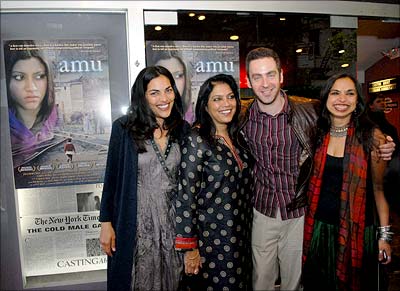
|
| (From left to right) Sarita Chowdhury, Mira Nair, Josh Green
and director Shonali Bose. |
Amu goes to New York
Nearly two years after it had a warm welcome at the Toronto International Film Festival, the poignant, stirring and pulse-quickening Amu is finally unrolling across America.
"It is a little film about one of the most horrendous tragedies in recent Indian history, the killing of thousands of Sikhs in New Delhi following the assassination of Indira Gandhi," says debutant director Shonali Bose.
"But it is also a story of a mother and daughter, the story of an Indian American woman (Konkona Sen Sharma) looking for roots. It works on many levels. Some reviewers have even called a it detective story."
Bose was warmly felicitated by director Mira Nair whose The Namesake is still running across North America in 250 theaters and has grossed a strong $12 million. Nair called Amu, which opens in two theaters in New York on May 25, "poignant, raw, bold and moving."
http://specials.rediff.com/movies/2007/may/15sd1.htm |
| |
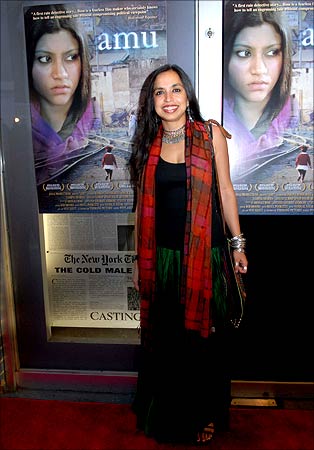 |
| Shonali Bose, Director |
Amu goes to New York
Nair was shooting a documentary in New Delhi when the attack on Sikh families took place. It was like reliving the chaos and violence her parent?s generation had seen during the Partition, she said.
Unknown to her then was Bose, a 19-year-old student of Delhi's Miranda House college, working in the slums helping the widows and children of the victims.
Bose, who later came to America to study political science at Columbia University, had co-written and acted in a street play on the Delhi Riots in 1984 which was performed in relief camps, riot-affected areas, markets, schools, and colleges across Delhi.
"I salute her vision, wisdom and courage," Nair said. The film has also been greatly appreciated by Deepa Mehta.
http://specials.rediff.com/movies/2007/may/15sd2.htm |
| |
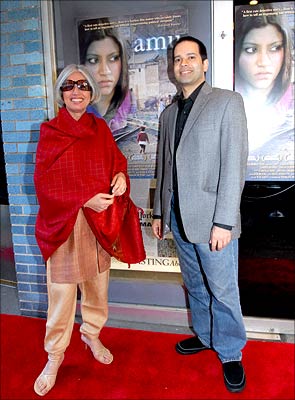 |
| Aroon Shivadasani & Box Office guru Gitesh Pandya |
Amu goes to New York
Bose, who embarked on the MFA Directing Program at UCLA's School of Theatre, Film, and Television, is telling the stories that need to be told, Nair said.
"If we don't tell our own stories, who will tell them?" she asked.
The premiere, which was also cosponsored by Asia Society and the Indo-American Arts Council, headed by Aroon Shivdasani, drew a number of Indian Americans active in independent theater and films. Shivdasani was the moderator at the Q&A session that followed the screening. She had also shown Amu at last year's IAAC annual film festival.
Angela Desai, one of the much acclaimed actresses and singers in the Broadway success Company, was also at the premiere. Desai, whose given name is Apsara, is the daughter of Indian and Filipina physicians. Also present were Sarita Choudhury and Debargo Sanyal, the latter's work in many offbeat and off-Broadway shows catching the attention of The New York Times.
http://specials.rediff.com/movies/2007/may/15sd3.htm |
| |
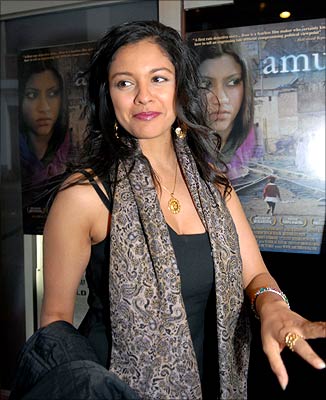 |
| Bombay Dreams actress Pooja Kumar |
Amu goes to New York
Bose said one of the reasons the release of the film took a long time was that she and her husband did not want the film to be released in the desi market, fearing that it would be gone in no time, swamped by the star-driven Bollywood films.
"Getting the Indian audiences seeing this film is very very important to us but we also wanted them to see the film in the mainstream theaters, and that it be treated like a mainstream film," she said.
Emerging Pictures, the distribution for Amu, is headed by Ira Deutchman, who, nearly 20 years ago, released Nair's first feature film, Salaam Bombay! In Canada, where Amu was released a few months ago in nearly 20 locations ranging from Vancouver to Toronto, "it was driven by the support of the working class," Bose said.
Bose and her husband raised a few thousand dollars to distribute the film by appealing to "ordinary Indians" through local radio stations in Canada. They put in their own money as well, and the film reportedly grossed a decent $250,000.
She recalled how many cab drivers, restaurant workers and people doing ordinary jobs sent in the money even though they had not seen the film. The film had a four week long run in Toronto, and ran for several weeks in other Canadian cities drawing, among others, a small but good number of Sikhs -- "especially the young," she said.
http://specials.rediff.com/movies/2007/may/15sd4.htm |
| |
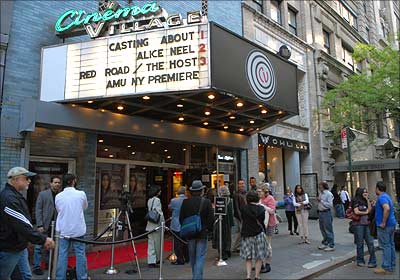 |
| The village cinema at New York |
| Amu goes to New York |
"Many of them (the young people) had no idea of what had happened in 1984," Bose said. "Many did not know anything at all about the riots and murders. And those who knew anything att all thought it was an attack by Hindu mobs. Our film showed that it is the politicians who orchestrated the killing, and there were indeed many Hindus who opposed it and worked against it."
She also saw the film as a healing instrument between the two communities.
"When Sikhs came to me and told me how they had become victims in India," she recollected, "I would also tell them they were victims just like many other segments including the farmers who kill themselves in India because of unbearable poverty? They are the victims of the ruling classes, the ruling elite."
Bedabrata Pain, one of the inventors of the active pixel sensor technology that produced the world's smallest camera in 1995, and led to the digital imaging revolution, provided the seed funding for Amu -- about $500,000.
He asked the audience at the premiere how many of them knew of the 1984 killings. The genocide in Rwanda to Darfur is widely discussed, he said, but not the 1984 massacre. "It is important for India, if it has to go forward as a civil society to address the issue, never mind how late it is."
"The issue of Delhi 1984 remains very much alive because even after 20 years, it remains a matter of justice denied," he said. "It is not possible for India to move forward if wounds like these are allowed to fester. The political trend that was set in motion in 1984 continues to haunt the Indian polity."
http://specials.rediff.com/movies/2007/may/15sd5.htm |
| |
|

